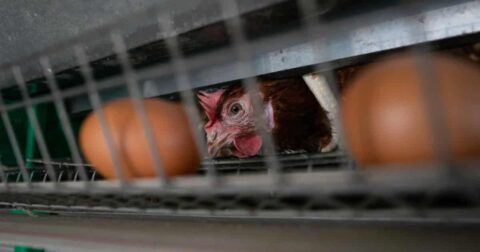Explainer
Animals Can Work Together, and Here Are a Few Notable Examples
Research•8 min read
Explainer
Contrary to stereotypes, the science proves chickens are intelligent animals who suffer.


Words by Seth Millstein
Many studies over the years have shown that chickens are smart, intelligent and feeling creatures. Yet there is still a widespread assumption that chickens are not smart animals. This may be due to how closely we associate them with food: after all, chicken is the most popular meat in the United States, with the average American consuming almost 100 pounds of chicken every year. Over 70 billion chickens are slaughtered worldwide annually, which is over 20 times the number of pigs, sheep and cows combined.
We have every reason to believe chickens are cognizant of their own suffering. They are capable of reasoning, empathizing, deducing and deceiving. They play with each other, sense when their young are in danger, recognize their owners and warn each other of nearby threats. Chickens can even perform mathematical calculations, and are capable of learning some concepts — such as object permanence and basic structural engineering — faster than humans.
According to the Sentience Institute, 99.9 percent of chickens raised for meat (known as “broiler chickens”) in the U.S. live out their lives in punishing factory farms. The abundance of evidence showing chicken intelligence has led many animal ethicists and advocates to question their confinement.
So, what do we know about the minds of chickens? How smart are these birds, and what might they be thinking and feeling?
First, it’s worth asking what exactly it means for a non-human animal to be “smart.” The concept of intelligence itself was invented by humans, for humans; when we call a person “smart,” we mean that they have a combination of knowledge and cognitive abilities that enable them to thrive as humans. To determine whether or not chickens are smart, then, we should ask: Do they have the requisite skills and abilities to survive and thrive as chickens?
The answer to that question is a resounding yes. Chickens are prey creatures with no natural defenses, and yet they’ve been able to survive and thrive for thousands of years, thanks in no small part to their intelligence. Let’s take a look at how.
Chickens are highly communicative: Using over 20 distinct vocalizations, they signal to one another “with remarkable precision about critical events in their world,” according to Dr. Chris Evans of Macquarie University. Chickens greet each other, express frustration, signal the presence of food, and announce when they’ve just laid an egg. They have different warning calls that they use when danger is approaching — one for air-based predators, another for ground-based predators — and a separate warning when a human tries to steal their eggs. Remarkably, some chickens even “name” their owners, writes Melissa Caughey in her book “How To Speak Chicken,” and use distinct cluck patterns to greet them.
In a 2005 study, chickens were presented with a button that, when pressed, gave them food. If they waited only a couple of seconds before pushing the button, they received a small amount of food, but if they waited an additional 20 seconds, they got a much larger bounty. Researchers found that 90 percent of the time, the chickens chose to wait for the larger prize. This demonstrated that the birds possess self-control and, by extension, the ability to project into the near future.
“An animal that can anticipate an event might benefit from cues to aid prediction, but may also be capable of expectations rendering it vulnerable to thwarting, frustration and pre-emptive anxiety,” noted Dr. Siobhan Abeyesinghe, author of the study. “The types of mental ability the animal possesses, therefore, dictate how they should best be managed and what we might be able to do to minimize psychological stress” in factory farms.
Chickens have a strikingly sophisticated awareness of numbers and math: A 2017 study showed that they can add, subtract, compare data sets and count from left to right, while a 2009 study demonstrated that newborn chicks are able to follow and win simple shell games.
“Chickens have the capacity to master skills and develop abilities that a human child can take months and years to accomplish,” writes Dr. Christine Nicol in her study, “The Intelligent Hen.”
In one experiment, objects were placed behind one of two obstructions and then shuffled back and forth. The chicks who observed the shuffling were able to keep track of which objects were where, and were consistently able to select the obstruction with the most objects behind it. In doing so, these chicks demonstrated not just mathematical abilities but object permanence, or the ability to understand that an object still exists even when it’s been obscured. Humans don’t learn object permanence until they’re two years old; these chicks, by contrast, were able to grasp the concept just five days after they hatched.
Like many other species, chickens are extremely protective of their young. A 2011 study found that mother hens stop preening and increase their distress vocalizations when their chicks appear visibly upset; this, the researchers explained, proves that “adult female birds possess at least one of the essential underpinning attributes of empathy.”
A 2013 study elaborated on this research and found that, when it comes to the safety of their chicks, hens are even more observant. In that study, mother hens behaved protectively not just when they witnessed their chicks in distress, but also when they recognized that their chicks were in an environment that the hen, based on her existing knowledge of threats and predators, recognized as potentially dangerous.
Chickens are capable of many positive social behaviors, but they can also be mischievous tricksters. Roosters will sometimes signal that food is near even when it isn’t in order to attract hens. Eventually, the hens wise up, and stop responding to those calls.
“These kinds of social strategies—deception and counter-strategies—are strikingly similar to the same kinds of complex behaviors identified in mammals, including primates,” writes Dr. Marino, author of an article on chicken intelligence in the journal Animal Cognition.
Chickens can recognize up to 100 faces, and they associate the faces they remember with positive or negative experiences, according to Marino’s study. They also display love and affection for the humans who care for them, and respond to different humans differently based on how those people have treated them.
Anybody with a flock in their backyard can tell you that chickens have individual personalities. Some are friendly, feisty and affectionate; others are cantankerous, lazy and stand-offish. It all depends on the bird.
“There is an abundance of anecdotal evidence for individual personalities in chickens from sanctuaries, small farmers, and people who keep backyard chickens,” Dr. Marino writes. “[They] show notable abilities to recognize individuals in their social group, as well as the ability to keep track of the group’s social hierarchy and the individuals within it…Not only do chickens recognize who is and is not a member of their social group, but they differentiate individuals within their own group.”
It’s with these abilities that chickens are able to create and maintain the pecking order, which is essential to their survival as prey animals.
Let there be no misunderstanding: Like humans and other animals, chickens can and do feel pain.
“[Pain receptors] have been identified and physiologically characterized in many different parts of the body of the chicken including the beak, mouth, nose, joint capsule, and scaly skin,” according to a study published in Applied Animal Behavior Science. “Stimulation of these [receptors] produces cardiovascular and behavioral changes consistent with those seen in mammals and are indicative of pain perception.”
Unfortunately, many common practices in poultry farming are liable to cause the chickens extreme pain. For instance, cutting the beaks off of newborn chicks prior to slaughter — common practice for broiler chickens — is acutely painful to the birds. Meanwhile, long term ailments like orthopedic disease and broken bones are common in broiler chickens; this may cause them chronic pain, which can last for weeks or months.
Broiler chickens are bred to grow large very quickly — they’re slaughtered at approximately 45 days old — and research shows that they suffer from the physical effects of this unnaturally paced growth. A recent study from the Global Animal Partnership concluded that chickens raised for faster growth “had lower activity levels, poorer indicators of mobility, poorer foot and hock health, higher biochemical markers of muscle damage, higher rates of muscle myopathies, and potentially inadequate organ development.”
In many ways, chickens are very similar to the animals we typically think of as household companions. Like dogs and cats, they’re unique individuals with different personalities, and are often inquisitive, playful and affectionate.
The general public is gradually coming to see the birds in this light. According to the Los Angeles Times, domestic chicken ownership is “one of the fastest-growing hobbies in the US,” with more than one percent of American households raising chickens as of 2017.
However, chickens also have different needs than the animals more commonly thought of as “pets.” Because of this, owners might not always be as equipped as they think they are to keep them humanely.
The Farm Animal Welfare Council has established welfare standards for farmed animals, known as the “Five Freedoms.” They are as follows:
This would seem to be a relatively low bar, and it’s generally an easy one to meet for people raising a small flock in their backyards. But in factory farms, it’s a different story. Undercover investigations have revealed that even on farms held to “high” animal welfare standards, chickens suffer. Many don’t even survive until slaughter.
“There are many ways of telling if a chicken is suffering,” animal welfare researcher Dr. Mary Baxter writes in The Conversation. “But to create truly positive environments for farmed broiler chickens, researchers must find ways of measuring their contentedness.”
So, what are signs of happiness in chickens? One is the extent to which they play with one another.
In the 1950s and ‘60s, researchers observed play-like behavior in chickens, which they described as “frolicking,” “sparring” and “food running.” Scientists later gave those behaviors different names, referring to them as “aggression” or “running-with-flapping.” This rebrand, Baxter writes, was “probably because of the general reluctance among scientists to attribute emotion or awareness to birds.”
But whatever you call that behavior, it ”fit[s] within well-established definitions of animal play,” Baxter says.
We don’t need to look only to industry guidelines to understand the behavior of chickens. Those who have interacted with them, be it at an animal sanctuary or in their own backyard, will tell you that chickens often purr when happy.
The evidence that chickens are intelligent and capable of feeling pain — and that they suffer in factory farms — is overwhelming. But because we farm and kill chickens by the billions every year, there may still be a disconnect in our ability to see these animals as sentient. Marino believes that to understand chickens’ intellect, we need to start studying them from a different viewpoint. “Most of the work that’s done on chickens, fish, and cows tends to involve trying to figure out how to make them lay more eggs or grow faster or not peck each other. It’s all very applied, and it misses the whole point,” Marino told Mental Floss. “These are animals who have an evolutionary and adaptive history, just like a chimpanzee or a dog or a human being. They’re animals. And at the very least, we need to approach them as animals in their own right.”